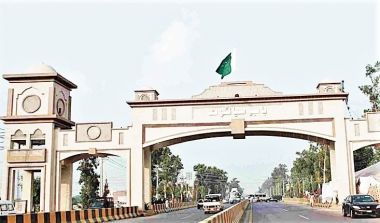Pakistani Christian jailed since March 2019 for blasphemy is granted bail

A mentally ill Christian jailed since March 2019 on a charge of blasphemy, punishable by death, has been granted bail, sources said.
Stephen Masih was arrested on 11 March 2019 after a Muslim mob burst into his home in Imranpura Bedian village, Sialkot District, beat him and other family members and accused him of speaking ill of the prophet of Islam after overhearing an argument, according to Masih's brother.
Lahore High Court Justice Tariq Saleem Sheikh granted bail to the 40-year-old Masih on 31 May, though it was kept private until 4 June for security reasons, his lawyer said.
In the 2019 attack, the Muslim mob also set ablaze the home of his family, members of the Brethren Mission, a Pentecostal branch. Police rescued Masih from the mob and charged him under Article 295-C of the Pakistan Penal Code (PPC) for allegedly insulting Muhammad. Conviction calls for the death penalty.
On that day Masih, who suffers from bipolar affective disorder, quarreled with his mother, sister, brother-in-law and neighbors and used abusive language unrelated to any religious subject or figure, according to family members. He reportedly used insulting language against a neighboring Muslim woman whose husband, Hafiz Mohammad Mudassar, retaliated by spreading rumors that Masih had defamed Islam's prophet.
"The court's decision is a victory for truth and justice, as Stephen was in prison for a crime he never committed," said Masih's lawyer, Abdul Hameed Rana, in a press statement. "There was a false testimony. Following his release on bail, we will continue our efforts to have him declared innocent and finally acquitted."
In July 2021, the Punjab Institute of Mental Health in Lahore reported that Masih was "unfit to stand trial at the moment," after which UN human rights experts appealed to Pakistan to immediately release him and expressed concern over his treatment by judicial and prison authorities "who are aware of his psychosocial disability and health condition."
Section 466 of the PPC relating to mentally challenged people facing investigation or trial stipulates freedom regardless of the charge so long as there is no risk that the accused would fail to appear in court when required, Rana said.
Granting Masih's bail on payment of a surety bond of 200,000 rupees (US$1,000), Justice Sheikh said, "The counsel for the complainant's contention is that the relatives of Stephen Masih may take him to an unknown place to save his life as the offense under Section 295C of the PPC is punished with death or imprisonment for life. However, he has not placed any material in support of his contention, which shows that it is merely an apprehension."
Rights activists welcomed the verdict, calling it a victory for truth. Voice for Justice Chairman Joseph Jansen said in a press statement that those who use false allegations of blasphemy to incite or engage in violence should be punished. He said police left Masih's mother with fractures of the leg and arm when she tried to keep officers from taking her son into custody.
"She has not been able to recover and is bedridden since then," Jansen said. "His family members fled the area and relocated to a safer place. This case is a clear example that blasphemy accusations stem from personal vendettas rather than genuine instances of blasphemy and lead to mob violence against the accused and their families."
Tehmina Arora, director of advocacy in Asia for Alliance Defending Freedom International, said the case was yet another horrible example of how people suffer under Pakistan's blasphemy laws.
"We welcome the court's decision to grant bail to Stephen Masih," Arora said. "We urge the court also to clear Masih of all charges. The many delays to the hearing of Masih's appeal have already caused him and his family enough suffering."
Human rights groups have called the allegations against Masih baseless, she noted.
"Given how easy it is to file case on charges of blasphemy, such laws have a chilling effect on the practice and propagation of one's faith," Arora said. "This is violative of international law."
Human rights activist Ashiknaz Khokhar noted that those accused of blasphemy in Pakistan have to face years of imprisonment with limited opportunity for bail. Attorney Farooq Bashir condemned the atmosphere of fear in Pakistan that thwarts justice.
"It is lamentable that none of the neighbors have had the courage to make a statement before the court about his [Masih's] mental condition due to threats associated with the blasphemy accusation," Bashir said.
Mere allegations of blasphemy often provoke mob violence and lynching of suspects in Pakistan. At least 1,949 people were subjected to false accusations of blasphemy, prolonged trials and displacement between 1985 and December 2021, according to the Centre for Social Justice (CSJ). At least 84 people were killed after being suspected or accused under blasphemy laws since their promulgation as part of former military ruler Ziaul Haq's Islamization during the 1980s, according to the CSJ.
Mobs killed two people accused of blasphemy and injured two others in four cities of Pakistan between December 2021 and March. Sri Lankan national Priyantha Kumara, 48, was accused of committing blasphemy at the factory he managed in Sialkot and was beaten to death by a mob last December. In in Khanewal in February, a mentally challenged Muslim, Mushtaq Ahmad, was stoned to death by an enraged mob after the son of a local cleric accused him of burning pages of the Koran.
Pakistan ranked eighth on Open Doors' 2022 World Watch List of the 50 countries where it is most difficult to be a Christian. The country had the second-highest number of Christians killed for their faith, behind Nigeria, with 620 slain during the reporting period from Oct. 1, 2020 to Sept. 30, 2021. Pakistan had the fourth-highest number of churches attacked or closed, with 183, and overall.











